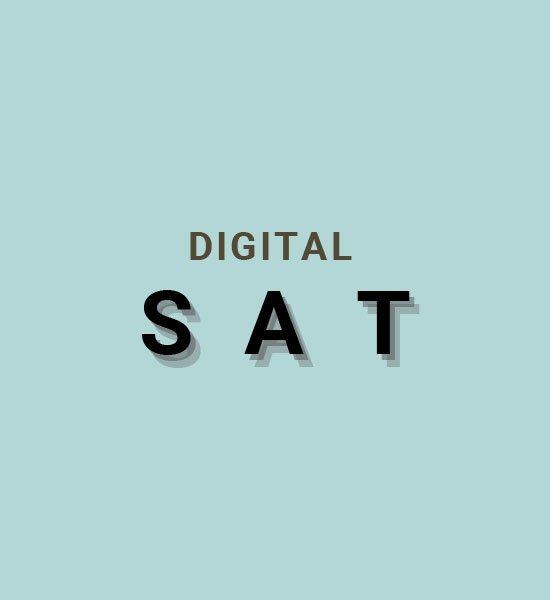Digital SAT
- Home
- Digital SAT

counselling for digital SAT
The Digital SAT is a new, computer-based version of the Scholastic Assessment Test, designed to assess college readiness by measuring critical skills in reading, writing, and math. This new format replaces the traditional paper-based test and incorporates various changes to adapt to a digital environment:
Digital Platform: The exam is administered on a computer or tablet. This format offers new interactive features and immediate scoring.
Adaptive Testing: The Digital SAT uses section-level adaptive technology, where the difficulty of the second section adjusts based on a student’s performance in the first section. This creates a more personalized testing experience.
Shorter Duration: The total time for the exam is shorter, reducing stress and fatigue. The test now takes about two hours compared to three hours for the traditional SAT.
Calculator Allowed Throughout: Unlike the traditional SAT, a calculator is allowed for the entire math section, providing more flexibility to students.
No Essay: The optional essay component has been removed from the Digital SAT, streamlining the exam.
The Digital SAT is scored on a scale of 400 to 1600, with two sections contributing to the total score: Math and Reading and Writing. Each section is scored between 200 and 800, allowing for a combined maximum of 1600. Although SAT scores do not technically expire, most colleges prefer scores that are no older than 4 years. Older scores may still be accepted, but it’s advisable to check with individual institutions for their specific policies.
Why is the Digital SAT Essential for College Applications?
The Digital SAT is used by colleges and universities to assess students’ readiness for college. It is valued for its standardization, providing a consistent way to compare students from diverse backgrounds. The digital format introduces adaptive testing, allowing for a more accurate assessment of students’ skills in reading, writing, and math.
While not all institutions require the SAT, many do, using it as part of a holistic admissions process that includes high school GPA, extracurricular activities, essays, and recommendations. The SAT also plays a role in determining eligibility for scholarships and honors programs. The Digital SAT’s shorter duration and flexible administration aim to reduce barriers to access, promoting fairness and broader participation in the college admissions process.
How Northgate Education Can Help
counselling for digital SAT
Northgate Education is committed to providing comprehensive support for students preparing for the Digital SAT.
counselling for digital SAT
Here are some of the ways we can help:
Digital Practice Tests: We offer practice test resources to help students become familiar with the exam’s interface, structure, and timing.
counselling for digital SAT
Personalized Coaching: Our experienced mentors tailor their teaching strategies to each student’s learning style, focusing on areas that need improvement.
counselling for digital SAT
Adaptive Test Preparation: We help students understand the adaptive nature of the test and develop strategies to maximize their performance in each section.
counselling for digital SAT
Skill-Building Sessions: We provide workshops to strengthen reading comprehension, grammar, and math skills, crucial for success in the Digital SAT.
Technology Training: We guide students on how to use the digital platform, including navigating the interface, using digital tools, and solving problems efficiently.
Test-Taking Strategies: Our mentors share proven strategies for managing time, dealing with adaptive question sequences, and staying calm under pressure.
Continuous Feedback and Support: We offer ongoing feedback on practice test results, student engagement, and progress identifying areas for improvement, and adjusting study plans as needed.
counselling for digital SAT
With Northgate Education’s personalized approach and expertise, students can gain the confidence and skills required to excel on the Digital SAT, enhancing their chances of admission to their desired colleges or universities. To learn more, reach out for a free consultation and discover how we can help you succeed on the SAT. Contact us today to get started.


